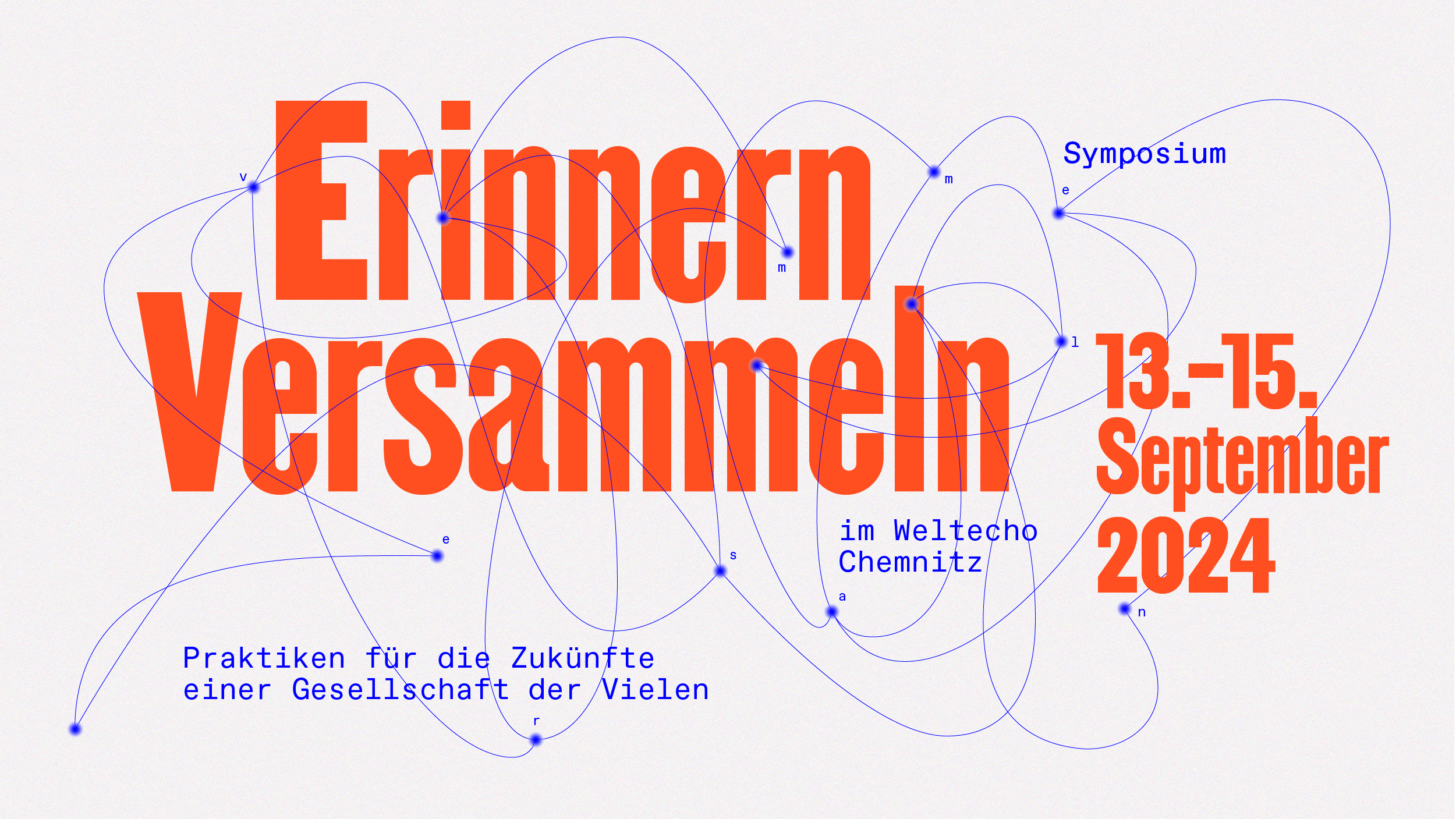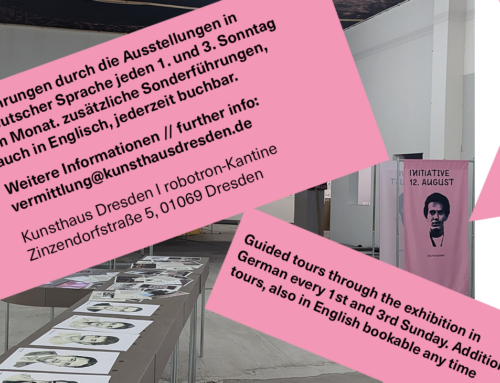
_________________________________________________________________________________________________
Assembled Remembering
Practices for the futures of a society of the many
Symposium September 13-15, Weltecho Chemnitz
Together we are inviting initiatives who are dedicated to accounting for and coming to terms with the past, memorial initiatives, and affected persons’ initiatives for an exchange on various questions:
🗺️Where do our remembrance and educational work stand?
🤝Where are the gaps in our work and where can we better support ourselves and others in our local work?
🗃️What role can archival practices play in this and how is remembrance changing and transforming in the face of various political developments?
🔃We are at a political turning point, as the upcoming state elections in the new federal states will once again make clear. That is why we want to meet in Chemnitz, the place where the commemoration of the NSU Komplex is being institutionalized for the first time by the emerging Pilot-Dokumentationszentrum.
🔄After decades of research and remembrance work by those affected, political struggles for remembrance are being renegotiated between civil society and institutions.
🤔How do we remember and commemorate today, what are the challenges and what is needed to strengthen past, present and future struggles?
🗨️We want to come together in Chemnitz to discuss these questions, connect and network.💬
Offener Prozess – NSU Aufarbeitung in Sachsen, the Rosa-Luxemburg-Stiftung, and Versammeln antirassistischer Kämpfe are inviting you to Chemnitz.
Program
Friday, September 13, 2024
**5:00 – 6:00 p.m.**, Weltecho
Arrival
**6:00 – 9:30 p.m.**, Weltecho, Club
Assembled Remembering: Kick-off to the symposium with artistic contributions and discussion
The opening of the symposium “Assembled Remembering – Practices for the Futures of a Society of the
Many” invites initiatives who are dedicated to accounting for and coming to terms with the past,
memorial initiatives and refugee initiatives as well as the interested public to exchange ideas. The focus
is on the political struggles for remembrance that are being renegotiated between civil society and
institutions after decades of research and remembrance work by those affected. The development of
the NSU Documentation Center in Chemnitz raises the following questions: How are we
commemorating and remembering today? What challenges does this pose and what is needed to
strengthen past, present and future struggles?
For us, “Assembled Remembering” means looking for what and who is missing and talking about it with
those who have been part of the memory politics’ struggles for years and decades. With contributions
from Hannah Peaceman (requested), Gamze Kubaşık, Ali Şirin and Aurora Rodonò, we can develop a
common understanding of where we currently stand with our remembrance work. In dialog with the
artistic contributions of filmmaker Claudia Tuyềt Scheffel and the MC Faeb from Leipzig, we want to
unfold the practices of a society of the many in a powerful way.
Afterwards, we will all gather for a joint discussion. With Annita Kalpaka, Aminata Cissé (requested) and
Fatima Maged (requested), we will expand our understanding by asking which life and resistance stories
remain (in)visible and (un)told. The importance of archives, telling history and political educational work
will help us to address the challenges and gaps in memory work.
Saturday September 14, 2024
Breakfast at Weltecho
Explorations
**9:30 a.m.**, Meeting point: Weltecho, then into the city
Critical Walk – A guided tour on the NSU-Komplex through the former Fritz Heckert urban area
The Critical Walk is dedicated to the architectural, social and political history of the former Fritz Heckert
area in the south of Chemnitz. One thematic focus is on the district as a place of residence, networking
space and crime scene of the NSU. We will visit the specific places where the NSU network lived and
committed crimes, and in doing so, approach the questions of how the NSU network was rooted in
Chemnitz and what a locally anchored accounting for the past might look like.
**9:30 a.m.**, Meeting point: Weltecho, then into the city
Pilot documentation center on the NSU-Komplex in Chemnitz
In memory of the victims of the NSU-Komplex, a pilot documentation center on the NSU-Komplex will be
opened in 2025, during the Capital of Culture Chemnitz 2025. We would like to show you the rooms of
the future pilot documentation center and present the concept for this place. Part of the center is the
traveling exhibition *Offener Prozess*, educational and mediation offers, a research area, an archive
and a meeting place – the Assembly.
**9:30 a.m.**, Weltecho
Guided tour through the satellites of the exhibition *Offener Prozess*
The exhibition *Offener Prozess* is dedicated to the effects of racist and right-wing acts of violence
using the example of the NSU-Komplex. The satellites of the exhibition, a smaller version of the overall
exhibition, include seven works, a chatbot (messenger service) as well as access to the contents of the
web exhibition and an interactive map. Among others, works by Želimir Žilnik, Harun Farocki, Thanh
Nguyen Phuong, Sefa Defterli, belit sağ and Forensic Architecture are represented. They shed light on
various aspects of the NSU-Komplex and refer to the profound temporal and spatial dimensions. The
aim is not to provide a comprehensive introduction to the NSU-Komplex, but to point out the
continuities of and resistance to racist and right-wing violence.
**9:30 a.m.**, Weltecho
Research projects
The project *Re/assembling antiracist struggles* is creating an open archive of anti-racist resistance
stories in East and West Germany. At Weltecho, we provide an insight into the digital and analog archive
through seven projects. These have processed movement histories and various anti-racist struggles in
the form of books, podcasts and video formats. The actors from different movement contexts
conducted interviews with contemporary witnesses, combed through archives and linked their findings
with their own experiences in order to further develop and work through them. In doing so, they
counteract the politics of denial as well as practices of ignoring and silence by making different
perspectives on diverse struggles accessible.
The research is dedicated to different movement histories
– Queers of Color in Germany, Tarek Shukrallah
– Leftist Africans in Hamburg, Josephine Akinyosoye & Johannes Tesfai
– jewish-queerfeminist Struggles and their networks (Angelika Levi & Alisa Limorenko)
– die Karawane München (Alice Hamdi & Mika Wodke)
– migrant-antiracist Feminisms (Annita Kalpaka, Brigitta Kuster, Efthimia Panagiotidis)
– Viet-German Communities in East Germany, Vũ Vân Phạm & Trong Do Duc
– Relatives and those affected of the NSU speak (Yasmin Dreessen).
Visitors can explore the research processes and projects in the form of audio stations, archive materials,
short texts and other formats on the Weltecho premises.
**9:30 a.m.**, Weltecho
Exhibition by Hami Wobowen and Ngoc Anh Pham
**12:30-1:30 p.m.**, Weltecho
Lunch
**1:30-3:30 p.m. & 4:00-5:30 p.m.**, Weltecho
Workshop 1: Archival Practices and Writing History
The classic and dominant form of the in many cases state archive is usually not a place that is open to
anti-racist actors and their struggles. Other institutions of memory also often ignore the historiography
of a society of the many. Anti-racist struggles therefore repeatedly pose the question of whose voices
are being heard and who can write the(ir) stories. These struggles manifest themselves in diverse forms
such as posters, flyers and self-organized media, which create fragments of a long and diverse history,
and disrupt the effectiveness of normative master narratives.
However, memories and contexts are often lost over time. In the project “Re/assembling anti-racist
struggles”, numerous activists have set out to find and interview contemporary testimonies and
witnesses. They create windows (“Schaufenster”) into an extensive but little-shared memory of an antiracist commons. Using archival materials, archive projects and historical works, we will get to know
queer-migrant struggles, the organization of left-wing Africans, migrant-antiracist feminisms and VietGerman resistance. We will talk quite practically about the challenges and joys of anti-racist archival and
historiographical practice – and perhaps also found new archives?
With contributions from Tarek Shukrallah, Women in Exile, Josy Akinyosoye, Johannes Tesfai, Andreas
Charis, Annita Kalpaka, Van Vu Pham, Trong Do Duc
Workshop lead: Lee Hielscher and Trong Do Duc
Organized by: Re/assembling antiracist Struggles
**1:30-3:30 p.m. & 4:00-5:30 p.m.**, Weltecho
Workshop 2: Political Educational Work from the Perspective of those Affected
NSU, Hanau, Halle…– In all places where racist attacks take place those affected, relatives and solidarity
initiatives are organizing. They keep the memory of the victims alive, do grief work, express their anger
and make demands for recognition, investigation, justice and appropriate commemoration. They explain
again and again how institutional and everyday racism operates and takes effect, who bears
responsibility for the violence and the lack of information and solving, and how solidarity-based action
can be facilitated and implemented. Nevertheless, especially in political education work, those affected
are repeatedly reduced to the role of witnesses, even though they themselves plan and conduct
workshops, panels and educational materials and are active as political educators.
The workshop explores the questions of how this (power-imbalanced) division can be removed and how
those affected, their relatives and the solidarity initiatives associated with them can be strengthened as
decisive actors in education. What does good solidarity-based cooperation need to look like in order to
work on an equal footing between the institutions of political education and the self-governing
structures? How can power sharing succeed in participation? What are the actors’ needs in order to be
recognized and taken seriously in their work?
The workshop invites people and initiatives to share their experiences and learn from each other. In
addition, formats for educational work that is centered on perspectives of affected people will be
developed.
With contributions from memory politics initiatives and educators.
Workshop lead: Gamze Kubaşık and Ali Şirin
Organized by: Rosa-Luxemburg-Stiftung und Offener Prozess
**5:45-7:00 p.m.**, Weltecho
Symbiosis
Saturday began with initial explorations of memory practices and offered space for intensive exchange
in two workshops. Now we want to bring the diverse experiences together in a symbiosis. What do we
take with us? What has set us in motion? What connections did we discover with each other? In an
exchange format, we will share our experiences and learning processes and learn about the formats and
actors that we have not yet been able to get to know. What questions about anti-racist futures open up
here? How can we leave the practices of the dominant society behind us and make a society of the
many a reality?
Sunday, September 15, 2024
**10:00 a.m.-2 p.m.**, Weltecho
Brunch & Worldcafé
Nationwide Federation and Call for Alliances
Sunday will be the day of arrangements and visions for the future. After two days of input and exchange,
this day is all about the nationwide federations, by bringing together the content of the last few days
and weaving together threads.
At the shared brunch, projects and work areas are invited to introduce themselves once again in the
World Café and talk about joint future prospects and collaboration.
At the shared brunch and in the World Café, projects and work areas are invited to introduce
themselves once again and talk about joint future prospects and collaboration.
**2:00 p.m.**, Weltecho
Group departure to the train station



